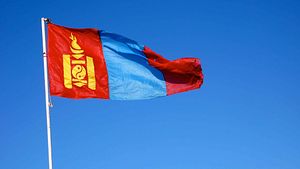In the past week, many pixels have been animated over the surprise announcement that a meeting between U.S. President Donald Trump and North Korean leader Kim Jong-un could be held before May. Given the actors involved, much will remain uncertain about such a meeting for some time. But, Ulaanbaatar continues to be mentioned as a possible location for such a meeting. Now, the Chief of Staff of the President of Mongolia has held meetings with U.S. and DPRK diplomats to express the country’s willingness to host a meeting. For Mongolia, this is an opportunity at positive visibility on the global stage that bolsters its foreign policy.
Z Enkhbold, chief of staff to Mongolian President Kh Battulga, met separately with the North Korean ambassador to Mongolia, O Sung Ho, and the U.S. chargé d’affaires Manuel Micaller on March 16 to highlight the possibility of hosting a meeting in Mongolia. Both diplomats responded that they would convey this discussion to their respective governments.
Beyond wanting to seize global interest, the offer to host such a meeting is a strategic choice that aligns with Mongolia’s foreign policy priorities.
Since the 1990 democratic revolution, Mongolia’s foreign policy rests on three pillars: constructive relations with its two immediate neighbors, China and Russia, engagement of more distant “third neighbors”, and multilateralism.
Mongolia’s powerful neighbors will be agreeable in supporting activities that may lead to a lessening of conflict on the Korean peninsula. For China, this is suggested by an editorial in the Global Times that raises the possibility of a meeting in Ulaanbaatar. Since Moscow has also not expressed reservations, Mongolia’s initiative may enhance relations with the two great powers.
In targeting “third neighbors” the offer to host the meeting also furthers Mongolian objectives. To Mongolian policy-makers, “third neighbors” are like-minded and friendly countries that can help balance the sway that immediate neighbors have over Mongolia.
Among third neighbors that are directly implicated in tensions on the Korean peninsula, the United States, Japan, and South Korea have wholeheartedly supported Mongolia’s democratization since 1990. During the recent commodity boom, Mongolia has sought ways to attract investments from these third neighbors to balance Chinese economic dominance. Likewise, Mongolia has continuously sought ways to facilitate connections between Japan and North Korea, especially over the abductee issue.
As a member of the United Nations, Mongolia is fulfilling its responsibility to provide good offices in resolving a major security challenge with global and regional implications. A visible effort in this regard will enhance Mongolia’s campaign for a seat on the UN Security Council in 2022 and boost other efforts for multilateral dialogue. Not coincidentally, Mongolia is the only state hosting American, Japanese, and South Korean troops along with the Chinese PLA for an annual military exercise – Khaan Quest. As an acknowledged nuclear-free state, Mongolia has a particular interest in nuclear non-proliferation.
Beyond these high-level foreign policy objectives, there are more specific aims that are supported by the offer to host a meeting. Mongolia has long been engaged in an effort not to isolate North Korea, partly rooted in a similar geopolitical fate and state-socialist past. Note that the Mongolian ambassador was the only foreign ambassador to remain in Pyongyang during the U.S. bombing in the Korean War and engagements have continued ever since.
Mongolia has increasingly focused on East Asia as a region of relevance to its foreign policy even when such regional engagement has not been elevated to an additional pillar in its foreign policy. The 2015 signing of an Economic Partnership Agreement with Japan is an example of a regional policy that goes beyond third neighbor engagement. If conflict on the Korean peninsula could ever be resolved peacefully that would be a great boost to the (North)East Asian region and thus benefit Mongolia’s economic and security situation.
Despite incurring some expenses and adding to traffic jams in the already-crowded Mongolian capital, the hosting of a meeting would reassure many Mongolians who worry about their flights via Seoul and the fate of 40-50 thousand family members working and studying in South Korea, as military tension escalates. All would applaud the country’s usefulness in resolving a conflict with potential impacts on many.
Dr. Julian Dierkes is an associate professor at the Institute of Asian Research of the University of British Columbia (UBC) in Vancouver, Canada where he teaches in the Master of Public Policy and Global Affairs. He and Mendee blog at http://blogs.ubc.ca.mongolia. Follow him on Twitter @jdierkes. Mendee Jargalsaikhan is a PhD candidate in Political Science at the University of British Columbia. His dissertation examines the development of Mongolia’s democracy. Follow him @MendeeJ.

































